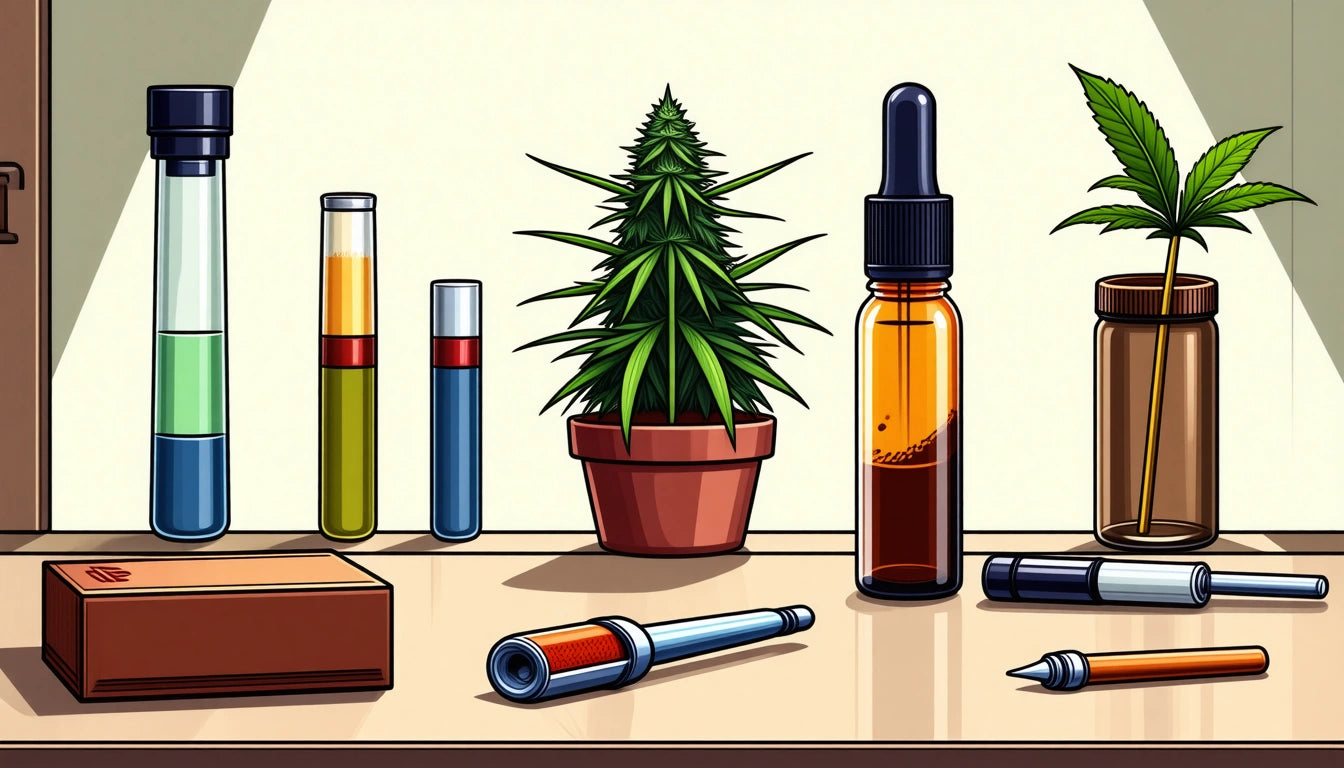Table of Contents
The Legal Status of Dabs and Dab Pens in Ohio and Oregon: What You Need to Know
Cannabis concentrates, commonly known as dabs, exist in a complex legal landscape that varies significantly between states. The question of whether dabs are legal depends entirely on your location, with stark contrasts between states like Ohio and Oregon. This guide explores the current legal status of dabs and dab pens in these two states, helping consumers and businesses navigate the regulatory environment.
Understanding Dabs and Concentrate Products
Dabs are highly concentrated cannabis extracts that contain elevated levels of THC, typically ranging from 60% to over 90%. These products come in various forms, including:
- Shatter
- Wax
- Budder
- Live resin
- Rosin
Unlike traditional flower, dabs require special equipment for consumption, such as dab rigs or electronic vaporizers (dab pens). According to our guide on understanding dabs, these concentrates have gained popularity for their potency and efficiency, but their high THC content has also raised legal concerns in many jurisdictions.
Legal Status of Dabs in Ohio
In Ohio, the legal status of dabs is straightforward: they remain illegal for recreational use. Cannabis concentrates are classified as Schedule I controlled substances under Ohio law. This classification means that possessing dabs can result in serious legal consequences.
Are Dabs a Felony in Ohio?
Yes, possession of dabs in Ohio can be charged as a felony. The severity of the charge depends on the amount in possession:
- Less than 5 grams: Fifth-degree felony (up to 12 months in prison)
- 5-10 grams: Fourth-degree felony (6-18 months)
- 10-50 grams: Third-degree felony (1-5 years)
- More than 50 grams: Second-degree felony (2-8 years)
The penalties are more severe than those for flower cannabis because concentrates contain higher THC levels and are processed substances. Manufacturing dabs through extraction methods can carry additional penalties, especially if using flammable solvents.
Legal Status of Dabs in Oregon
In stark contrast to Ohio, dabs are legal in Oregon for both medical and recreational use. Oregon was among the early adopters of recreational cannabis legalization through Measure 91, which passed in 2014 and was implemented in 2015.
Legal Framework in Oregon
For adults 21 and older in Oregon:
- Purchase limit: Up to 5 grams of concentrates per day from licensed dispensaries
- Possession limit: Up to 16 ounces of concentrates at home
- Public consumption: Remains illegal regardless of the product form
Oregon's regulatory framework includes strict testing requirements for concentrates to ensure they're free from residual solvents and contaminants, as detailed in our article on how dabs are made.
Dab Pens and Vaporizer Regulations
Dab pens, which are portable vaporizers designed for concentrate consumption, follow similar legal guidelines as the concentrates themselves.
Are Dab Pens Legal in Ohio?
Dab pens containing THC concentrates are not legal for recreational use in Ohio. For medical patients, vape products are available but with restrictions:
- Maximum THC content is regulated
- Devices must be purchased from licensed dispensaries
- Empty vape devices without THC are legal to possess
Ohio's medical program does permit certain patients to use vape products, but the concentrates must be obtained through the state's regulated program. Recreational users found with dab pens containing THC concentrates face the same penalties as possession of other concentrate forms.
When it comes to consumption methods, many users prefer pre-filled options for convenience and discretion. Our selection of custom pre-roll cones provides an alternative for those in states where concentrates face stricter regulations than flower products.
Penalties and Prosecution Considerations
The legal consequences for dab-related offenses vary dramatically between Ohio and Oregon:
Ohio Enforcement
In Ohio, law enforcement actively prosecutes cases involving dabs. Penalties can include:
- Substantial fines starting at $2,500
- Felony criminal record
- Mandatory minimum sentences in some cases
- Driver's license suspension
Manufacturing concentrates using butane or other explosive solvents can result in additional charges related to reckless endangerment or operating a drug manufacturing facility.
Oregon Enforcement
In Oregon, enforcement focuses primarily on:
- Sales outside the regulated market
- Possession exceeding legal limits
- Underage possession or use
- Manufacturing without proper licensing
Even in Oregon, unlicensed production of concentrates, especially using volatile solvents, remains illegal and can result in serious charges.
State-by-State Comparison: Ohio vs Oregon
The contrasting approaches between these states highlight the patchwork nature of cannabis laws in the United States:
- Ohio: Medical program only, concentrates heavily restricted, possession potentially a felony
- Oregon: Full legalization, regulated market for concentrates, possession limits enforced
This disparity creates significant challenges for consumers who travel between states and for businesses operating in multiple markets. As explained in our ultimate guide to dabs, understanding local laws is essential before purchasing or possessing any concentrate products.
Ongoing Legal Developments and Future Outlook
The legal landscape for cannabis concentrates continues to evolve. In Ohio, there have been ballot initiatives and legislative efforts to expand cannabis access, which could eventually impact concentrate regulations. Oregon, meanwhile, continues to refine its mature regulatory framework, particularly around testing standards and potency limits.
For consumers and businesses, staying informed about these changes is crucial. The penalties for misunderstanding or violating concentrate laws can be severe, especially in states like Ohio where dabs remain illegal for recreational use.
As more research emerges about concentrates and their effects, as discussed in our comparison of dabs and traditional cannabis, regulatory approaches may continue to evolve. The trend across the country suggests a gradual movement toward regulated access rather than prohibition, but this process varies dramatically by state.











Leave a comment
All comments are moderated before being published.
This site is protected by hCaptcha and the hCaptcha Privacy Policy and Terms of Service apply.